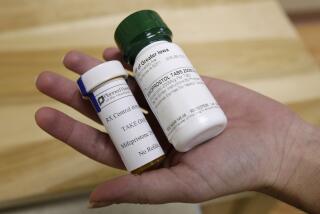BODY WATCH : The Pill’s <i> Other</i> Duties : Medicine: Most doctors know that higher doses of the birth control drug can be used as postcoital contraception. But it seems a lot of women don’t.
- Share via
NEW YORK — Dr. Alywn Cohall got a phone call late one night from a panicked young couple. The chief of adolescent medicine at St. Luke’s Hospital here said the unmarried couple told him that their condom had broken during intercourse. They had heard about the so-called morning-after pill, which can prevent pregnancy up to 72 hours after intercourse, and wanted to know if they could get it. Now.
Cohall told them to be calm and to meet him the next morning at his office. There, he gave the young woman birth control pills, instructed her to take several of them right then, and to take a second dose 12 hours later. (Depending on the prescription, a doctor will prescribe two to four.) About half of women have some nausea and about one-quarter vomit from the higher doses of the Pill, so Cohall also prescribed an anti-nausea drug.
Cohall’s treatment--in which higher doses of the ordinary birth control pill are given within 72 hours after intercourse--is the most common form of emergency contraception. And, in this case, it seemed to work: The young woman did not become pregnant.
The remarkable thing about this story is not that it occurred, family planning experts say, but that it happens as infrequently as it does. A recent poll by the Kaiser Family Foundation found that 40% of American women had never heard of using birth control pills as emergency postcoital contraception and only 1% had ever used them that way.
“The tragedy is that the technology is something we’ve known about so long and it’s such a well-kept secret,” says Dr. Robert Hatcher, borrowing from the title of the newly published book he co-authored, “Emergency Contraception: The Nation’s Best Kept Secret” (Bridging the Gap Communications).
Although it’s not clear how, higher doses of the ordinary birth control pill--which contain the hormones estrogen and progestin--seem to prevent a fertilized egg from implanting on the wall of the uterus and apparently also inhibit ovulation and sperm movement. Progestin-only pills, called mini-pills, also can be used as emergency contraception, apparently working the same way. Although both are called morning-after pills, they actually can be taken up to three days after intercourse. Both reduce the risk of pregnancy by 75%, experts say.
Hatcher, a professor at the Emory School of Medicine in Atlanta, says doctors have been advising their patients to use birth control pills as a form of postcoital contraception since the 1960s.
Paige Cunningham, president of the legal arm of the antiabortion movement, Americans United for Life, says her group has not taken a strong stance on the morning-after pill because it’s still unclear how it works.
“I have some real concerns about it,” she says. “The cumulative effect on women’s bodies is unknown at this point.”
There have been no long-term studies specifically designed to look at possible risks to the fetus if emergency contraception fails--the ultimate “side effect.”
But Hatcher says there is no evidence of increased birth defects among women who have inadvertently continued to take the Pill after they were pregnant.
Anybody who normally shouldn’t take the Pill probably shouldn’t use it as an emergency contraceptive, experts say.





